-

人教版新目标初中英语八年级上册Can you come to my party教案3篇
Step 3 (3b)First, tell the students when we talk about our future plans, we often use: I’m+verb+ing When we talk about what we must do, we use have to. Ask the students to fill in the blanks in 3b. The answers are: shopping, go to see, a test, I’m going, my family. Step 4 (3c)Let the students write an e-mail message to a friend. Say why you can’t visit next. Before the exercise, ask the students to give some possible answers and write them on the blackboard. So the students will feel easy to finish the writing exercise. After they finish it, Let them to correct it in groups first. Each group chooses theirs best one to read in front of the whole class. Step 5 ( planning a party )First read the conversation in the box together. Then ask the students to turn to page 88.Write down everything you have to do next week. Write in all the things you have to do . Ask the students to look at the list. Ask them “What day are you free?” This is when you can have your party. Step 6 (Self check 1 )Let the students to fill in the blanks with the words given. Change the forms of the words if possible. Then make their own sentences. The answers are: visit, playing, have to, study, comeStep 7 (Self check 2)Imagine you are Marie. Read the information and look at your schedule. Write replies to the invitation.

人教版新目标初中英语八年级上册Could you please clean your room教案3篇
一、 教学内容Section A 1a----1c二、 教学目标1.学习词汇do the dishes, make the bed, take out the trash, fold the clothes, do the laundry, sweep the floor, clean the living room.2.句型 Could you please clean your room? Yes, sure.三、 教学准备 学生预习本单元所有的词汇多媒体课件 活动表 奖品四、 教学过程Pre-task1. Warming upEnjoy ourselves. Watch cartoon Cinderella. 看动画片段《灰姑娘》导如入本课话题和新词汇“chores”美丽善良的鬼姑娘因继母的嫉妒,每天得做所有的家务。片段的主题使学生联想到本课的话题。2. learn new words and phrasesLook! What is she / he dong? 看图学习动词词组do chores, do the dishes, make the bed, take out the trash, fold the clothes, do the laundry, clean the living room.3. Guessing game.What is she doing ? 4. Pair work. 1a, Do you do these things at home? Write “Y” for “yes” and “N” for “no”.5. Listening . 1b , Peter’s chores or Mom’s chores?理解目标语Could you please clean your room? Yes, sure.Write “M” for Mom’s chores, “P” for Peter’s chores in the chart.6. PairworkLook at the picture,Ask your partner to do the chores that you see. 7. Interview Who is the most able at home? 1) What chores do you do at home? How often do you do the chores? Work in four, interview each of the students in the group, fill in the chart.
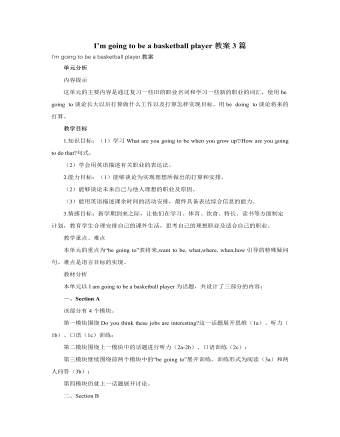
人教版新目标初中英语八年级上册I’m going to be a basketball player教案3篇
教学目标1.知识目标:(1)学习What are you going to be when you grow up?/How are you going to do that?句式。(2)学会用英语描述有关职业的表达法。2.能力目标:(1)能够谈论为实现理想所做出的打算和安排。(2)能够谈论未来自己与他人理想的职业及原因。(3)能用英语描述课余时间的活动安排,最终具备表达综合信息的能力。3.情感目标:新学期到来之际,让他们在学习、体育、饮食、特长、读书等方面制定计划,教育学生合理安排自己的课外生活,思考自己的理想职业及适合自己的职业。教学重点、难点本单元的重点为“be going to”表将来,want to be, what,where, when,how引导的特殊疑问句。难点是语言目标的实现。教材分析本单元以I am going to be a basketball player为话题,共设计了三部分的内容:一、Section A该部分有4个模块。第一模块围绕Do you think these jobs are interesting?这一话题展开思维(1a)、听力(1b)、口语(1c)训练;
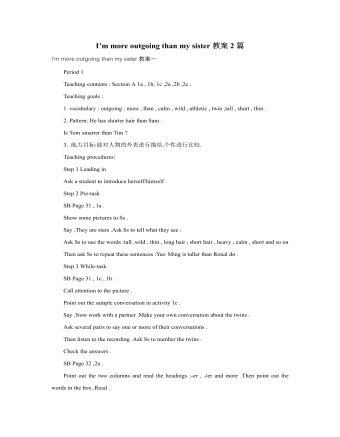
人教版新目标初中英语八年级上册I’m more outgoing than my sister教案2篇
1 交通工具的比较此活动为小组活动。学生通过讨论找出到达某一城市可乘坐的各种交通工具,并选择最佳出行方式。Teacher:We’re going to Shanghai. How many ways can we use to get there? Yes, there are four ways: by bus, by plane, by train, by ship. Please discuss how you are going to get there.操作建议:(1)学生以小组为单位展开活动,谈论本组所选择的交通工具。(2)各组选代表向全班汇报,阐述本组所选择的交通工具的利和弊。完成任务所需要的语言结构:We can go there by ship. It’s more comfortable and cheaper than any other transportation.We can go there by bus. It’s cheaper but it takes longer time.2 哪个城市更合适?此活动具有挑战性。假设中国要举行2014年世界杯足球赛,分别从历史,人文,天气等方面对各城市(北京,大连,上海,昆明)进行比较,选择最佳举办城市。T: Imagine China is holding the 2014 FIFA World Cup. Which city do you think is the best for the World Cup, Beijing, Dalian, Shanghai or Kunming? Let’s work in groups. If you choose Beijing, please join the Team Red. If you chose Dalian, please join the Team White. If you choose Shanghai, please join the Team Blue. If you choose Kunming, please join the Team Green. Please show us its advantages. Then let’s see which team will win.

人教版新目标初中英语八年级下册He said I was hard-working教案2篇
This activity introduces some new vocabulary and provide oral practice using the target language.Task 1 . Ask four students to stand in front of the class, and the teacher asks them the following questions as a reporter.1.What are you going to do when you grow up?2.What are you going to do next week?3.What are going to do after school?The students will give different answers, then ask a good student to report what they said.I am going to e a doctor.What did she say?----------She said she was going to be a doctor.I am going to have a party on Friday night.What did he say?-------He said he was going to have a party on Friday night.I am going to do my homework.What did she say ?------ She said she was going to do her homework.I am going home after school.What did she say?-----She said she was going home after school.Say In this unit we are going to learn to use words like to report what someone said.Task 2. Read the instructions. Then ask a student to read the four questions. And write the words on the Bb. Explain what soap opera is.Task 3. Ask the students to Look at the pictures, point out the TV screens in the picture. Ask one girl to read what Marcia said.What did Marcia say? She said She said she was having a surprise party for Lana on Friday night. Repeat the other pictures in the same way.Activity3. Listen and number the pictures in activity 1a.
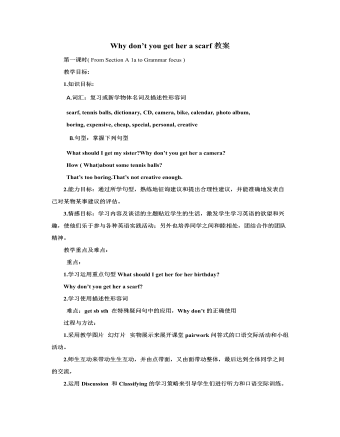
人教版新目标初中英语八年级下册Why don’t you get her a scarf教案
教师带领学生复习有关描述宠物的词汇,采用教师提问学生回答的方进行。如:T:What animals do you think would be good pets?What animals do you think would be bad pets?What do you think are good animals for a six-year-old child?然后学生进行 pairwork 练习。Task two: 师生互动,学习探究 1、播放3a部分的录音,引导学生一边听录音,一边跟读。2、通过听录音学生回答以下问题:Why do you think pot-bellied pigs are popular?What are the advantages and disadvantages of keeping such a pet?教师对学生的回答进行及时点评。3.学习范文,学习重点短语,为下步的模仿写作提供语言素材。T :1. )Have you ever kept a pig as a pet?Do you like pigs? St.:No.…Why don’t you like to keep a pig? St: No.They’re too dirty and lazy(Do you know in some foreign countries like Hollyland, Australia,pigs are the most popular pet.there’s a kind of pig.(图)it has an interesting name? it ‘s called a pot-bellied pig.) Now,let’s learn an article about this kind of interesting pet.2.)play the tapeSt.:Listen and repeat3.)show some Qs on computer(本子St.: read silently,then answerthe Qs(本子)4.)Ask ss. Close book and retell this passage.(what is a pot-bellied pig? Is it a good or bad pet? ) St.: retell it to each other“A pot –bellied pig is a popular pet now…”5.read the article together.St.:.practice reading
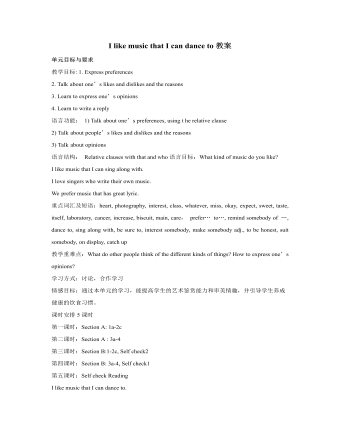
人教版新目标初中英语九年级上册I like music that I can dance to教案
教学目标: 1. Express preferences2. Talk about one’s likes and dislikes and the reasons3. Learn to express one’s opinions 4. Learn to write a reply 语言功能: 1) Talk about one’s preferences, using t he relative clause2) Talk about people’s likes and dislikes and the reasons3) Talk about opinions语言结构: Relative clauses with that and who语言目标:What kind of music do you like?I like music that I can sing along with.I love singers who write their own music.We prefer music that has great lyric.重点词汇及短语:heart, photography, interest, class, whatever, miss, okay, expect, sweet, taste, itself, laboratory, cancer, increase, biscuit, main, care, prefer… to…, remind somebody of …, dance to, sing along with, be sure to, interest somebody, make somebody adj., to be honest, suit somebody, on display, catch up教学重难点:What do other people think of the different kinds of things? How to express one’s opinions? 学习方式:讨论,合作学习情感目标:通过本单元的学习,能提高学生的艺术鉴赏能力和审美情趣,并引导学生养成健康的饮食习惯。课时安排5课时第一课时:Section A: 1a-2c第二课时:Section A : 3a-4第三课时:Section B:1-2c, Self check2第四课时:Section B: 3a-4, Self check1第五课时:Self check ReadingI like music that I can dance to.

人教版新目标初中英语九年级下册By the time I got outside, the bus had already left教案
Ⅰ. Teaching Aims and Demands1. Knowledge Objects(1) Key Vocabularyoversleep(2) Target LanguageWhat happened?I overslept. And by the time I got up, my brother had already gotten in the shower.2. Ability Objects(1) Teach the students to use the new words.(2) Train the students to narrate past events with the Past Perfect Tense.(3) Train the students' listening and speaking skills with the target language.3. Moral ObjectIt’s a good habit to go to bed early in the evening and get up early in the morning. So you’ll never be in a hurry in the morning.Ⅱ. Teaching Key Points1. Key Vocabularyoversleep2. Target LanguageNarrate past events with the Past Perfect TenseⅢ. Teaching Difficult Points1. Train the students to narrate past events with the Past Perfect Tense.2. Train the students to understand the target language in spoken conversation.Ⅳ. Teaching Methods1. Thinking of examples from the students' real lives.2. Making sentences by looking at the pictures.Ⅴ. Teaching AidA tape recorderⅥ. Teaching ProceduresStep I Revision1. Revise the language points in Unit 8.Ask some questions like this: What volunteer work would you like to do?Help the students to answer, I’d like to…/I love to…/I hope to2. Practice the dialogue in Activity 3c on page 62 again. Get students to role play the similar dialogues with the following.

人教版新目标初中英语九年级上册Where would you like to visit教案2篇
The First PeriodⅠ.Teaching Aims and DemandsKnowledge Objects(1) Key Vocabularytiring, educational, fascinating, thrilling, peaceful, exotic, trek, jungle, take it easy, explore, historic, site(2) Target LanguageWhere would you like to go on vacation?I’d like to trek through the jungle, because I like exciting vacations.2. Ability Objects(1)Train students to talk about places they would like to visit with the target language.(2)Train students to describe vacations with different adjectives.(3)Train students' listening skill.3. Moral Object,It′s more interesting to go on vacating somewhere instead of staying at home.Ⅱ. Teaching Key Points1. Key Vocabularytiring, educational, fascinating, thrilling, peaceful, exotic, trek, jungle, take it easy, explore, historic, site2. Target LanguageTalk about different places with the target language.Ⅲ. Teaching Difficult Points1. Describe vacations with different adjectives.2. Talk about different places with the target language.Ⅳ. Teaching Methods1. Teaching by illumination2. Teaching by doing chain drills3. Teaching by pairworkⅤ. Teaching Aids1. A tape recorder2. Some pictures of different places with famous views

人教版新目标初中英语九年级下册Rainy days make me sad教案
1. 教材分析本单元以how do things affect you?为话题, 从颜色、天气、音乐、广告、产品等方面谈论了外界事物如何影响人的心情。要求学生掌握表达某物或某事给人带来的感觉、看法或影响等。共设计了四个部分的内容:Section A 该部分有4个模块:第一模块围绕Which restaurant would you like to go to?这一话题展开思维(1a)、听力(1b)、口语(1c)训练;第二模块围绕How does music affect you? 进行听力(2a-2b)、口语训练(2c);第三模块继续围绕how do colors in the restaurant affect you这一话题展开训练,训练形式为阅读和问题体验(3a)和小组活动(3b);第四模块仍就How do things affect you这一话题以调查的形式展开讨论。Section B该部分有4个模块:第一模块围绕产品广告对人们的影响这一话题以“配对”(1a)与“列举”(1b)两种形式展开训练;第二模块继续围绕How do things affect you? 进行听力(2a-2b)、口语对话训练(2c);第三模块围绕“Advertising”这一话题展开阅读(3a-3b)和写作(3c)训练;第四模块围绕How posters affect you这一话题以口语训练形式展开小组活动。

人教版新目标初中英语九年级下册I’ll help clean up the city parks教案
Talk about offering help (P60)I’ll help clean up the city parks.A: I’d like to work ...B: You could help ...Talk about ways to tell people about the Clean-Up Day (P61)We need to ...We can’t ...I’ll ...Talk about the work the volunteers do (P62)These three students all volunteer their time to help other people.Somebody loves to ... / helps ... / plans to ... / wants to ...A: What do you like doing?B: I like ... A: What kind of volunteer work do you think I could do?B: You could ...1. 重点词汇advertisement, fix, repair, pleasure, blind, deaf, shut, carry, specially, fetch2. 认读词汇hunger, homeless, cheer, clean-up, sign, establish, major, commitment, elementary, veterinarian, coach, similar, call-in, strategy, disabled, organization, unable, support, appreciate, donation, part of speech, pronoun, adverb, preposition, conjunction, donate, Jimmy, Sally3. 词组clean up, cheer up, give out, put off, set up, think up, take after, fix up, give away, put up, hand out, work out, at once

新人教版高中英语必修1Unit 1 Teenage Life-Listening and Speaking & Listening and Talking教案
Step 2 Listening and Talking1. The teacher is advised to talk with their new students about the related topic: Boys and girls, do you know some structures to talk about future activities? Talking about future activitiesWe’ll …I plan to …There’ll be …I hope to …We’re going to …2. After their small talk, the teacher can move on by playing the listening and solve the following task.Underline the expressions in the sentences below Cao Jing and Max use to talk about the future.We’ll learn useful skills.I plan to improve my spoken English.There’ll be students from different schools.I hope to make new friends.We’ll talk about teenage life.I’ll learn to make a fire.There’ll be students from different countries at the camp.There’ll be some experts there to show us how to live in the wild.We’re going to learn about wildlife.I’m going to give a speech.I think I’m going to enjoy the activities.I think we’ll have a lot of fun.3. Work in groups. Plan a youth camp.Teacher make the Ss think of ideas for the camp. And they can use the questions below to get started. And have the Ss present their ideas for a youth camp to the class.●What kind of camp is it?●Who will be there?●What will they do?●What will they learn?

新人教版高中英语必修1Unit 3 Sports and Fitness-Listening and Speaking & Listening and Talking教案
Finally, after finishing the task above, the teacher is expected to instruct students to work in groups to finish the following project:Speaking ProjectWhat event or activity would you like to invite your friend to? Make a conversation with a partner.Ski Race: Zhangjiakou, a beautiful city in northern China, will host the Youth Ski Race in December.Track Meet: a great event for track –and –field lovers on 26 October.Gym Class: come and work out at a gym! You can make it.Part 2: Listening and Talking:The teacher is advised to talk with their new students about the related topic: Boys and girls , what do you think of sportsmanship? Let’s listen and find out:Play the listening and match each opinion with the right speaker. Who do you agree with? Why?Cao Jing _____________ Lily _____________ Max _____________A. An athlete should do his/her best to win.B. The girl should stop and help the other girl. Good sportsmanship is more important than wining!C. An athlete should think about honor and his/her fans if he/she is competing for his/her country.Listen again and circle the expressions that you hear in the conversation.

新人教版高中英语必修1Unit 3 Sports and Fitness- Discovering Useful Structures—tag questions教案
【教材分析】This teaching period mainly deals with the grammar: tag questions.This period carries a considerable significance to the cultivation of students’ spoken English. The teacher is expected to enable students to master this period thoroughly and consolidate the knowledge by doing some exercise of good quality.【教学目标与核心素养】1. Get students to have a good understanding of the basic usages of tag questions.2. Enable students to use the basic phrases structures flexibly.3. Develop students’ speaking and cooperating abilities.4. Strengthen students’ great interest in grammar learning.【教学重难点】1. How to enable students to have a good understanding of the basic usages of tag questions.2. How to enable students to use the basic usages of tag questions flexibly.【教学过程】Step1: 语法自主探究一、基本组成方法1.肯定式陈述部分+否定附加疑问部分(前肯后否) You often play badminton, don’t you? 你经常打羽毛球,是吗?You are going to the gym with me, aren’t you?你要和我一起去健身房,是吗?She’s been to shanghai before, hasn’t she? 她以前去过上海,是吗?2.否定式陈述部分+肯定附加疑问部分(前否后肯) It isn't a beautiful flower, is it? 那不是美丽的花,是吗?You didn't go skating yesterday, did you? 你昨天没去滑冰,是吗?They can’t finish it by Friday, can they?他们不能在星期五之前完成,是吗?
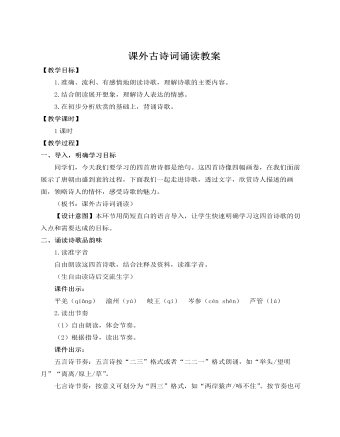
人教部编版七年级语文上册课外古诗词诵读(一)教案
(1)示例一(横向联想) 李白的送别诗:①“思君不见下渝州”,表达依依惜别的无限情思,可谓语短情长。②“仍怜故乡水,万里送行舟”,意思是“我”还是怜爱故乡的水,流过万里送“我”远行。这一句运用了拟人的修辞手法,将故乡水拟人化,借写故乡水有情,不远万里,依依不舍送“我”远别故乡,表达了诗人离开故乡时依依不舍、思念故乡的感情。③“孤帆远影碧空尽,唯见长江天际流。”这两句看起来似乎是写景,但在写景中包含着一个充满诗意的细节。李白一直把朋友送上船,船已经扬帆而去,而他还在江边目送远去的船帆。李白望着帆影,一直看到帆影逐渐模糊,消失在碧空的尽头,可见目送时间之长。帆影已经消失了,然而李白还在翘首凝望,这才注意到一江春水,在浩浩荡荡地流向远远的水天交接之处。“唯见长江天际流”,是眼前景象,可是谁又能说是单纯地写景呢?李白对朋友的一片深情,李白的向往,不正体现在这富有诗意的神驰目注之中吗?诗人的心潮起伏,不正像那浩浩东去的一江春水吗?
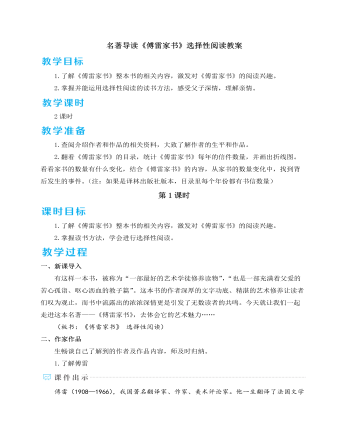
人教部编版语文八年级下册名著导读《傅雷家书》 选择性阅读教案
评价:这段话表明傅雷朋友的角色。他把孩子当成朋友,为人生得一知己而感到兴奋、自豪。在读这段话时声音应洪亮,感情应充沛。小结:我们组还发现傅雷对傅聪的称呼有很多,如聪、聪儿、孩子、亲爱的聪、亲爱的孩子。有时两个同时用,比如“聪,亲爱的孩子!”一直以来,我们都觉得父爱不善表达,可是傅雷的这些亲昵直白的称呼表达了他对傅聪的爱,是这么的温柔,如慈母一般。所以,读这些称呼时我们要读得轻柔深情些。【设计意图】这一环节不仅能展示学生的阅读成果,还能使学生感受到阅读的成就感,并在相互交流中产生更深刻的理解和感悟,在朗读和评价中体会父爱。二、感悟成长1.解读“虎爸”师:在同学们的阅读分享中,傅雷这样一个深爱儿子的父亲形象深入人心。其实,傅雷早期对傅聪的教育是很严苛的,是一个“虎爸”的形象。我们一起来看一则小故事。
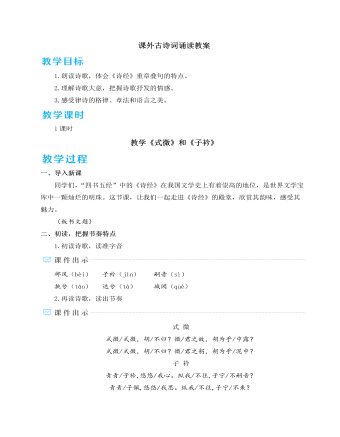
人教部编版语文八年级下册课外古诗词诵读教案
预设 “海内存知己,天涯若比邻”一反送别诗伤感悲戚的格调,体现出高远的志趣和旷达的胸怀,表明诚挚的友谊可以超越时空。此句蕴含哲理,给人以莫大的安慰和鼓舞,因此成为远隔千里的朋友间表达深情厚谊的名句。设问3:“气蒸云梦泽,波撼岳阳城”中的“蒸”和“撼”换成“滋”和“摇”好不好?为什么?预设 不好。“蒸”是蒸腾的意思,形象地描绘了洞庭湖雾气蒸腾、湖面浩渺的画面;“撼”是摇撼的意思,描绘出了洞庭湖波涛汹涌似要撼动岳阳城的雄伟壮阔的景象,且“撼”还能传达出诗人面对湖水时心胸似乎也被震荡,从而想要建功立业的主观感受。如果换成“滋”和“摇”则显得境界小、力度弱,没有这样的气势和表达效果。【设计意图】此环节主要采用问题引领的方式,一步步引导学生品味诗歌中的名句和富有表现力的字词,感受古人炼字的智慧,从而更加深入地理解诗歌情感和艺术手法。
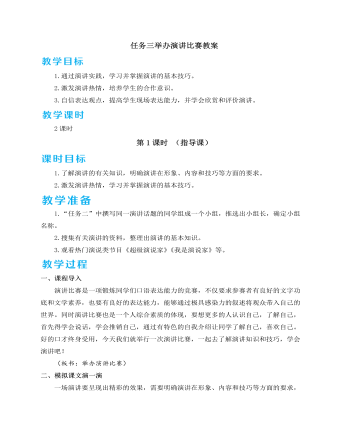
人教部编版语文八年级下册任务三举办演讲比赛教案
本环节通过评委宣布比赛规则和评分细则,为下面比赛活动中,学生学会欣赏和评价演讲打下基础。三、八仙过海赛一赛(主持人组织演讲比赛)演讲比赛的程序:1.各组参赛同学抽签,确定演讲顺序。2.参加比赛的同学按照顺序进行演讲,每位选手演讲完毕,评委现场打分。3.评委根据评分细则评分,去掉最高分和最低分,记分员核算出选手的平均分,并由主持人公布最后得分。4.每位参赛者演讲结束,评委和教师进行简要点评。5.第二轮由每组得分最高的选手进行即兴演讲拉票,决出班级前三名。6.主持人宣布比赛结果。7.活动结束。【设计意图】本环节通过演讲比赛和评价两个活动的交互进行,让学生进一步理解演讲技巧的具体运用方法,从而提高演讲能力。在整个演讲活动中,学生组织活动和实施活动的能力可以得到充分地展现和发挥。四、尺短寸长评一评1.精彩的演讲结束了,在这次演讲比赛中,给你留下深刻印象的演讲有哪些?请说明理由。(生自由发言,对演讲活动进行总结评价)2.在这次精彩的演讲比赛中,大家有哪些收获?请结合活动过程具体来谈。
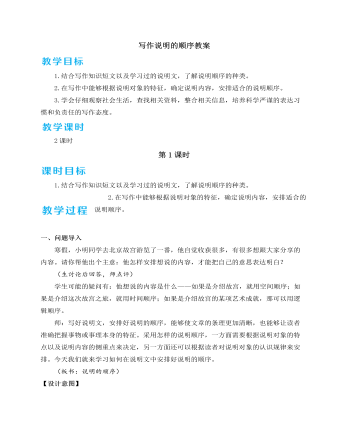
人教部编版语文八年级下册写作说明的顺序教案
片段三:大殿正中是一个约两米高的朱漆方台,上面安放着金漆雕龙宝座,背后是雕龙屏。方台两旁有六根高大的蟠龙金柱,每根大柱上盘绕着矫健的金龙。仰望殿顶,中央藻井有一条巨大的雕金蟠龙。从龙口里垂下一颗银白色大圆珠,周围环绕着六颗小珠,龙头、宝珠正对着下面的宝座。梁枋间彩画绚丽,有双龙戏珠、单龙翔舞,有行龙、升龙、降龙,多态多姿,龙身周围还衬托着流云火焰。——黄传惕《故宫博物院》 (1)找出三个片段中关于说明顺序的标志性词语。预设 片段一:立春过后、再过两个月、不久、于是转入、到了秋天、准备迎接。片段二:首先、此外、还可以、也可以。片段三:正中、上面、背后、两旁、殿顶、中央、周围、下面、周围。(2)学生归纳结论。预设 正确使用标志性的词语,能使对说明对象及内容的介绍更清楚。(3)小组讨论:以时间、空间或逻辑为序的说明语段,通常使用哪些标志性的词语?预设 时间顺序的说明语段一般要运用表示时间或先后的标志性词语;空间顺序的说明语段要运用表示方位的词语,如“东、西、南、北、里、外、左、右”等;逻辑顺序的说明语段可使用“首先”“其次”“再次”等表示由主到次的词语。
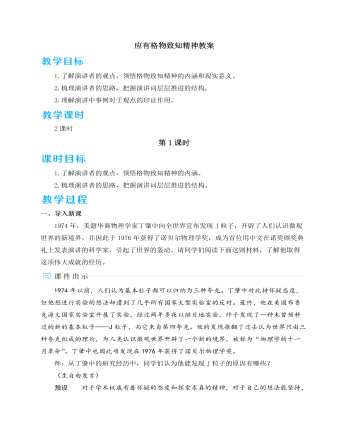
人教部编版语文八年级下册应有格物致知精神教案
1.了解演讲者的观点,领悟格物致知精神的内涵。2.梳理演讲者的思路,把握演讲词层层推进的结构。 一、导入新课 1974年,美籍华裔物理学家丁肇中向全世界宣布发现J粒子,开辟了人们认识微观世界的新境界,并因此于1976年获得了诺贝尔物理学奖,成为首位用中文在诺奖颁奖典礼上发表演讲的科学家,引起了世界的轰动。请同学们阅读下面这则材料,了解他取得这项伟大成就的经历。1974年以前,人们认为基本粒子都可以归纳为三种夸克。丁肇中对此持怀疑态度,但他想进行实验的想法却遭到了几乎所有国家大型实验室的反对。最终,他在美国布鲁克海文国家实验室开展了实验,经过两年多夜以继日地实验,终于发现了一种未曾预料过的新的基本粒子——J粒子,而它来自第四夸克。他的发现推翻了过去认为世界只由三种夸克组成的理论,为人类认识微观世界开辟了一个新的境界,被称为“物理学的十一月革命”。丁肇中也因此项发现在1976年获得了诺贝尔物理学奖。





